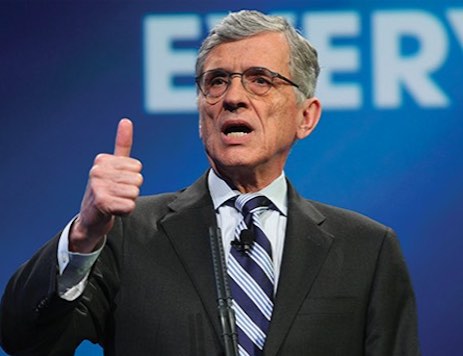Wheeler Proposes Tech-Neutral Special Access Approach

The smarter way to stay on top of broadcasting and cable industry. Sign up below
You are now subscribed
Your newsletter sign-up was successful
FCC chairman Tom Wheeler wants special access service regulation to be tech neutral, whether it is being provided by incumbent telcos (ILECs), competitive telcos (CLECs) or cable operators, and he has the reform framework ready to roll—it was circulated to the other commissioners April 7.
The goal is to promote more competition, competition, competition (the chairman's mantra) for business services, which could include price regulation on cable service where it does not face competition.
Special access lines are dedicated connections used by businesses and institutions to deliver voice and data traffic, including for ATMs and credit card transactions. The regs have been applied to the larger ILECs—Verizon, AT&T,, CenturyLink and Frontier—but the chairman thinks they should apply across the board where more competition is needed. FCC officials speaking not for attribution signaled the FCC had concluded there was more competition in high-bandwidth (above 50 meg) services and less in low-band.
Wheeler has scheduled a vote on those special access (or what he appears to prefer to call business data services, or BDS) reforms for the April public meeting and says he wants an order by year's end.
That news came in a blog post Friday in which he outlined the basic principles of his Notice of Proposed Rulemaking.
Those principles are that the FCC would identify markets that are competitive and ones that aren't, and tailor regulations fo fit. "All BDS services should be governed by the same overarching legal principles," he said.
The proposal will prevent some specific contractual practices--all or nothing provisions, shortfall and early termination penalties (invalidating excessive penalties, not reasonable ones)--in specific pricing plans the FCC looked at in its investigation of the market, and which it says slow the switch from legacy to IP-based services, and it would end all tarriffing of BDS services in all markets, competitive or not.
The smarter way to stay on top of broadcasting and cable industry. Sign up below
The item also includes a further notice asking how to employ the framework and seeking comment on how to determine where competition does and does not exist.
The FCC has been collecting data to make that determination and just this week started allowing stakeholders to share that data in aggregated form.
The chairman's blog comes a day after Verizon and INCOMPAS (which represents CLECs) came out with a compromise special access proposal that also suggested the tech-neutral that would bring cable into the regulatory fold in terms of possible price caps where their business buildouts did not face competition, so the National Cable & Telecommunications Association was already pushing back on suggestions it should be subject to new regs.
The FCC official pointed out that the proposal poses more questions than answers, including about how to apply regulations to all players to incent investment and competition, "including from cable."
"Cable operators are new entrants in the business services market, and are investing heavily in building their own facilities to serve business customers," NCTA said following the telcos' cable-targeted compromise. "They are providing precisely the type of facilities-based competition that the Chairman has praised. The FCC should reject any call to impose new, onerous regulations on an industry that is stepping up to offer meaningful choices to business customers. The FCC will not achieve competition if it burdens new facilities-based entrants with regulation.”
"Business data services, historically known as special access, are little known but hugely important in our connected economy and society," Wheeler blogged. "These dedicated network connections are used by offices, retailers, banks, manufacturers, schools, hospitals and universities to move large amounts of data. Consumers use them indirectly every time they withdraw cash from an ATM or swipe their credit card at a retail store. And mobile networks are heavily dependent on the use of BDS for the backhaul of mobile traffic. This dependence will only grow as wireless carriers expand their networks and move into 5G wireless, which promises tremendous opportunities for economic growth, job creation and U.S. competitiveness.
"If we want to maximize the benefits of business data services for U.S. consumers and businesses, we need a fresh start.
"The marketplace is changing. Cable companies are entering the market, and Internet Protocol (IP)-based technologies can now deliver services traditionally satisfied by legacy, circuit-based products. Yet, competition remains uneven, with competitive carriers reaching less than 45 percent of locations where there is demand."
In a 3-2 party line vote in August 2012, the FCC suspended its benchmarks for deregulating the rates of special access services while it said it better determined where there is competition for that service.
Under FCC rules, telcos are required to lease special access lines to competitors, like cable operators. But the FCC deregulated AT&T and others' special access lines in 2009 in cases where competitive triggers are met.
Those lines are the "last mile" dedicated broadband lines to businesses, which incumbent local exchange carriers like AT&T dominate. By contrast, residential customers can generally choose from cable or phone lines for their service.
Contributing editor John Eggerton has been an editor and/or writer on media regulation, legislation and policy for over four decades, including covering the FCC, FTC, Congress, the major media trade associations, and the federal courts. In addition to Multichannel News and Broadcasting + Cable, his work has appeared in Radio World, TV Technology, TV Fax, This Week in Consumer Electronics, Variety and the Encyclopedia Britannica.

